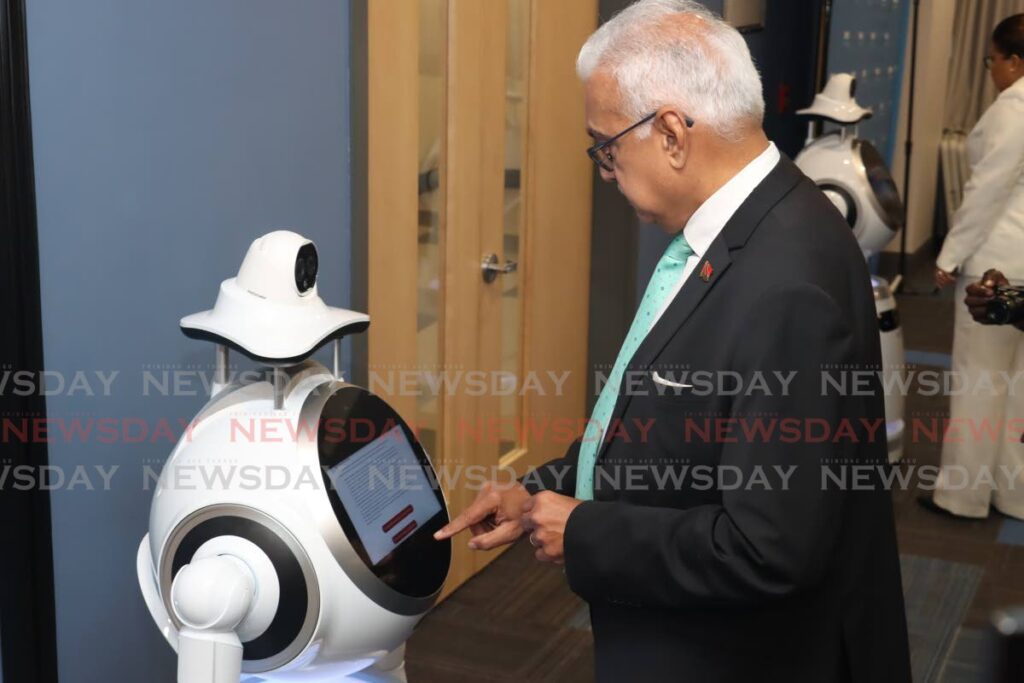Experts discuss AI versus humans in Trinidad and Tobago healthcare

"Are humans more empathetic than robots?"
Dr Ronnie Sebro posed this question at the Artificial Intelligence (AI) in Healthcare conference at Hilton Trinidad, Port of Spain on November 26, causing an equally comical and uncomfortable stir among the health experts in the room unprepared for the answer.
As Dr Sebro, a radiologist at the Mayo Clinic in Minnesota, shared surprising results of a study published in the Journal of the American Medical Association (JAMA), some members of the audience were faced with the unsettling realisation that artificial intelligence (AI) could not only outperform humans in diagnostic accuracy but also emotional intelligence.
The research, comparing human and AI responses to health queries on Reddit’s Ask A Doctor forum, found that AI provided more accurate answers and was perceived as more empathetic than humans.
"That's okay,” said Dr Sebro.
“We could take that.
“But what we couldn’t take was that ChatGPT came across as more empathetic than the doctors. That’s the problem."
Dr Sebro’s anecdote encapsulated the vast achievements and potential of generative AI in medicine, which, according to several presenters, is far greater than in any other industry.
However, as he spoke about the evolving relationship between humans and machines in patient care, he cautioned against blind reliance on these technologies.
While AI excels in precision, he explained, it lacks the reasoning and human touch that patients often need during their care.
The NCRHA, CEO Davlin Thomas said, has firmly positioned itself at the forefront of AI integration in TT’s public healthcare.
In his opening remarks at the conference, Thomas shared the authority’s vision of the widespread adoption of AI to revolutionise diagnostics and treatment.
“The introduction of AI technology to support this ecosystem presents us with an intriguing dynamic – one that promises to enhance the patient’s experience, increase our efficiency to meet growing demand, boost our capacity in administrative, technical and clinical processes, and optimise support systems for staff, patients and stakeholders,” Thomas said.
The conference, themed Catalysing Change: Exploring the Transformative Impact of Artificial Intelligence on Patient Care, marked the first such designated event hosted by a regional health authority.
Thomas expressed confidence in AI’s transformative potential, saying, “Indeed, the future of healthcare looks bright and we are excited about the role AI is going to play. It is inevitable.”
He added that AI’s potential to enhance preventative care, optimise administrative processes and create a seamless experience for patients and staff is a cornerstone of NCRHA’s plans. Thomas also addressed the need for a “systems approach” to healthcare innovation, saying AI would allow the public health sector to address growing demands and improve overall health outcomes.
“We are mindful, not only of the metaphorical stone that we throw into the water, but we’re also cognisant of where the waves go and where the ripples resonate,” he added.
Thomas also spoke about the NCRHA’s ongoing efforts to integrate AI into its preventative care initiatives, noting that the authority has carried out large-scale health screenings and wellness programmes, with over 3,000 participants. He said by further leveraging AI, such efforts could be scaled to reach more patients, improve early detection of illnesses and deliver more effective interventions.
Despite the promising benefits, he acknowledged the ethical and emotional considerations of the mass integration of AI into healthcare, a sentiment echoed by other speakers at the conference, including Prof Wayne Frederick, a Trinidad-born surgeon and former president of Howard University.
Frederick addressed AI’s potential to improve healthcare outcomes for underserved populations, noting that AI could be harnessed to personalise treatments, making healthcare more accessible and effective. He stressed, however, the importance of diversity in developing and applying AI in healthcare.
Its effectiveness, he said, depends on the diversity of its input data, and the absence of such diversity can lead to biased outcomes that may disadvantage certain groups.
“If you don’t have diverse inputs, you’re making decisions for just a certain group of people,” said Frederick.
“This can result in bias in data, which AI then inherits, and that becomes problematic.”
He also called for robust regulatory frameworks to guide AI’s rapid development to ensure its integration into healthcare does not exacerbate existing health disparities.
While Frederick said he was optimistic about AI’s potential, he cautioned against viewing AI as a replacement for the human element in healthcare.
It should rather complement healthcare professionals, bringing benefits such as efficiency and precision while preserving the compassionate, human side of patient care.
Frederick also stressed an urgent need to integrate computer science and AI into medical and nursing curricula.
“Today, I would argue that one of the issues we have in healthcare is that our curriculum is not advancing rapidly enough,” he said.
“Our medical curriculum has to include more information about computer science and more information about artificial intelligence.”
AI in healthcare aims to address chronic diseases and long-term care as discussed at the conference.
Dr Tra’Chella Johnson-Foy delivered a presentation on AI’s applications in chronic-disease management, before Dr Navi Muradali addressed the development of AI tools tailored to the needs of regional healthcare systems. He noted that AI could help local healthcare providers overcome unique challenges facing smaller or underserved populations.
Leslie Lee Fook, director and co-founder of Incus Services, delivered a presentation on how analytics could enhance decision-making and operational efficiency in healthcare from a data-driven perspective.
He explained how AI could be used for mining large amounts of health data, improving clinical decision-making and helping providers offer more targeted interventions.

Comments
"Experts discuss AI versus humans in Trinidad and Tobago healthcare"